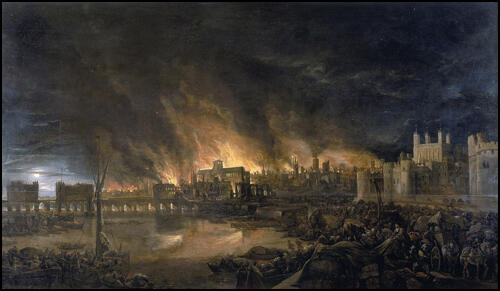Great Fire of London
A fire began in a baker's shop in London on 2nd September, 1666. As the result of a strong east wind, the fire raged for four four days destroying 87 churches and more than 13,000 houses. The fire was eventually stopped by blowing up buildings in its path.
Charles II had to appoint someone to take charge of rebuilding London. After much thought the king gave the job to his childhood friend, Christopher Wren. This included the task of building fifty-two new churches.
Wren was also commissioned to design and rebuild St. Paul's Cathedral. St. Paul's took thirty-five years to build. The most dramatic aspect of St. Paul's was its great dome. It was the second largest dome ever built (the largest was St. Peter's Basilica in Rome). Both domes were based on the one in the Pantheon built by the ancient Romans.

Primary Sources
(1) Samuel Pepys recorded in his diary the Great Fire of London in September 1666.
Some of our maids sitting up late last night to get things ready against our feast today, Jane called us up, about 3 in the morning, to tell us of a great fire they saw in the City. So I rose, and slipped on my nightgown and went to her window, and thought it to be on the back side of Markelane at the furthest; but being unused to such fires as fallowed, I thought it far enough off, and so went to bed again and to sleep. About 7 rose again to dress myself, and there looked out at the window and saw the fire not so much as it was, and further off. So to my closet to set things to rights after yesterday's cleaning. By and by Jane comes and tells me that she hears that above 300 houses have been burned down tonight by the fire we saw, and that it was now burning down all Fishstreet by London Bridge. So I made myself ready presently, and walked to the Tower and there got up upon one of the high places, Sir J. Robinsons little son going up with me; and there I did see the houses at that end of the bridge all on fire, and an infinite great fire on this and the other side the end of the bridge - which, among other people, did trouble me for poor little Michell and our Sarah on the Bridge. So down, with my heart full of trouble, to the Lieutenant of the Tower, who tells me that it begun this morning in the King's bakers house in Pudding-lane, and that it hath burned down St Magnes Church and most part of Fishstreet already. So I down to the water-side and there got a boat and through bridge, and there saw a lamentable fire. Poor Michells house, as far as the Old Swan, already burned that way and the fire running further, that in a very little time it got as far as the Stillyard while I was there. Everybody endeavouring to remove their goods, and flinging into the River or bringing them into lighters that lay off. Poor people staying in their houses as long as till the very fire touched them, and then running into boats or clambering from one pair of stair by the waterside to another. And among other things, the poor pigeons I perceive were loath to leave their houses, but hovered about the windows and balconies till they were some of them burned, their wings, and fell down.
Having stayed, and in an hour's time seen the fire rage every way, and nobody to my sight endeavouring to quench it, but to remove their goods and leave all to the fire; and having seen it get as far as the Steeleyard, and the wind mighty high and driving it into the city, and everything, after so long a drougth, proving combustible, even the very stones of churches, and among other things, the poor steeple by which pretty Mrs Horsley lives, and whereof my old school-fellow Elborough is parson, taken fire in the very top and there burned till it fall down - I to Whitehall with a gentleman with me who desired to go off from the Tower to see the fire in my boat - to Whitehall, and there up to the King's closet in the chapel, where people came about me and I did give them an account dismayed them all; and word was carried in to the King, so I was called for and did tell the King and Duke of York what I saw, and that unless his Majesty did command houses to be pulled down, nothing could stop the fire.

